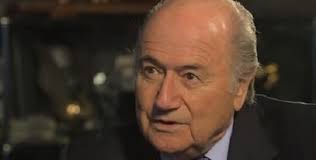By Andrew Warshaw and Paul Nicholson in Zurich
May 29 – Sepp Blatter used the most important presidential address of his 17-year reign today by suggesting the brutal scrutiny he and his organisation have come under would not have occurred had Russia and Qatar had not been chosen to stage the 2018 and 2022 World Cups.
“The World Cups in 2018 and 2022 have been called into question ,” said Blatter. “If two other countries had emerged from the envelope (in December 2010) I think we would not have these problems. However, we can’t go back in time.”
Blatter opened his address saying: “Given the special circumstances holding congress after the events of last Wednesday and of the storm that followed and major discussions that came my report will be different than usual and that is because I will address what happened and look at how to go forward.”
He also said that this kind of tumult was not unprecedented in FIFA, referencing 2002 and a dispute when 11 members of the executive committee brought a criminal complaint against Blatter.
“Events have thrown a shadow across congress,” said Blatter. “I will try to lift that shadow and our spirits. We can’t let our reputation be dragged through the mud. Those truly at fault – they are individuals, not the entire organisation. They have lost track that it is a team sport with the same goal and same song sheet.”
But Blatter did not completely pass off the blame on the individuals, nor did he accept full responsibility himself, saying: “I will accept as president of FIFA responsibility but share it with the executive committee and all of you – this is our government.
“We are at a turning point and we need to pull together and move forward. We cannot constantly supervise everyone in football. We are 209 associations, 6 confederations, 300 million participants, and with their family and friends there are 1.6 billion directly and indirectly touched by our organisation.”
Referring to the arrests and seizure of FIFA documents and data by the Swiss authorities that has rocked world football over the past two days, Blatter pointed a finger in the direction of the US.
“It has not been good for all of this to emerge two days before the FIFA presidential election,” he said. “I will not use the word co-incidence but I do have a small questionmark.”
There can be little doubt that there is an American agenda at work, the full extent of which is still to be seen, and the US Department of Justice press conference on Wednesday left no-one in any doubt that the Americans are coming with an intent to clean up world “soccer” their way.
Even Russian president Vladimir Putin on Thursday criticised the American indictments and claimed they were designed to undermine Blatter’s re-election as president. The US authorities have denied this is the case. But the “questionmark” still remains.
Drawing his address to a close, Blatter again called for unity, saying: “It’s a matter of trust, of commitment. Together we can do this. It’s about having the will. Let’s go for it and repair what has been thrown down, and do it immediately. Right now.”
His address, which preceded not only the election ballot but also a critical decision over how to resolve the suddenly almost forgotten Israel-Palestine issue, ended in familiar fashion. Four years ago, when Blatter entered what he said at the time would be his final term, he threw down a nautical metaphor about steering FIFA’s wobbling ship back into steady waters.
Having changed his mind about standing, he was at it again using precisely the same language. “Join us to put FIFA back on the right track where boats will stop rocking and go placidly into port.”
It is unlikely the stormy waters will calm as quickly as FIFA and its federations would like, particularly considering the US aircraft carriers that made their presence felt earlier this week.
As Blatter sought to convince delegates he was the right man to carry on, a warning shot across FIFA’s bows was fired by Domenico Scala, chairman of its audit and compliance committee.
Scala referred only briefly to the arrests and charges made by the Swiss and United States justice authorities earlier this week but pointed out that FIFA had already done much to clean up its own act. “FIFA has delivered an impressible list of material changes to its governance,” he said.
But far more was needed, he said. In fact, FIFA needed a massive culture change.
“To enact these changes across the entire football pyramid requires much more than a set of instruments, it requires the recognition that the culture needs to change,” he said.
“To support the change we need a culture than censures inappropriate behaviour and enforces rules vigorously, fairly and responsively. The effect is to eliminate improper conduct and passive acceptance of weaknesses in our conduct.”
Contact the writer of this story at moc.l1744970368labto1744970368ofdlr1744970368owedi1744970368sni@w1744970368ahsra1744970368w.wer1744970368dna1744970368 or paul.nicholson@insideworldfootball

